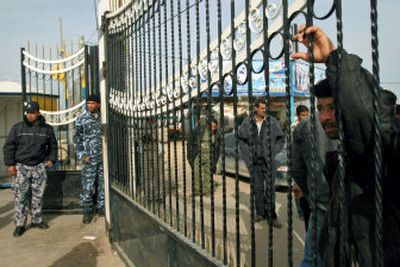Palestinian feud shuts border crossing

JERUSALEM – In a sign of escalating chaos in the Gaza Strip, Palestinian police officers furious over the slaying of a colleague stormed the Palestinian-administered border crossing into Egypt on Friday, firing guns into the air and forcing European monitors to flee their posts.
The confrontation, which sent Palestinian travelers scrambling for safety as they clutched their bags and bundles, came scarcely a month after Palestinian officials assumed control of the Rafah border crossing under an agreement personally brokered by Secretary of State Condoleezza Rice.
Following the early-morning clash, the gunmen quickly dispersed and the frontier reopened about six hours later. But Israeli officials said the incident raised concerns about the Palestinian Authority’s fitness to administer an international frontier – the first over which it has ever been ceded control.
At the time, the deal clinched by Rice during a visit to the region was hailed as an important foreign-policy achievement for the Bush administration, as well as a key test of Palestinian sovereignty in Gaza. Israel withdrew troops and Jewish settlers from the territory over the summer after nearly four decades of occupation.
The brief seizure of the Rafah crossing was the latest episode in a feud between members of the Palestinian security forces and a prominent local Palestinian clan. A policeman was killed in an armed clash between the two sides Thursday in the center of Rafah, and on Friday afternoon, gunfire broke out near the same spot, killing a bystander – a 14-year-old Palestinian boy.
The fighting was a prime example of the factionalism and gang warfare that plague the crowded and impoverished territory of 1.3 million people. In Gaza, loyalty to extended family and political factions nearly always takes precedence over any allegiance to the Palestinian Authority, led by President Mahmoud Abbas.
The southern tip of Gaza, where the Rafah crossing is located, has traditionally been particularly lawless. Clan-based criminal gangs for years have made a lucrative trade of smuggling weapons and ammunition through tunnels under the Gaza-Egyptian border.
The continuing unrest in Gaza represents a dangerous display of weakness on the part of the Palestinian Authority, which next month will face off against the militant group Hamas in parliamentary elections. Hamas has made a strong showing in municipal elections in the West Bank and Gaza, and is expected to pick up a considerable number of parliamentary seats in the Jan. 25 balloting.
The Gaza chaos “has ramifications and implications for the whole peace process,” said Raanan Gissin, an adviser to Israeli Prime Minister Ariel Sharon.
“If the Palestinian Authority cannot impose law and order in the most basic manner that is required to have a functioning civil society, how do they expect to establish a Palestinian state living peacefully side by side with Israel?” Gissin said.
Palestinian officials vowed to take measures to halt the spiraling internal violence. “All those acting outside the law will face the consequences,” said Brig. Gen. Alaa Hossni, the police chief in Gaza.